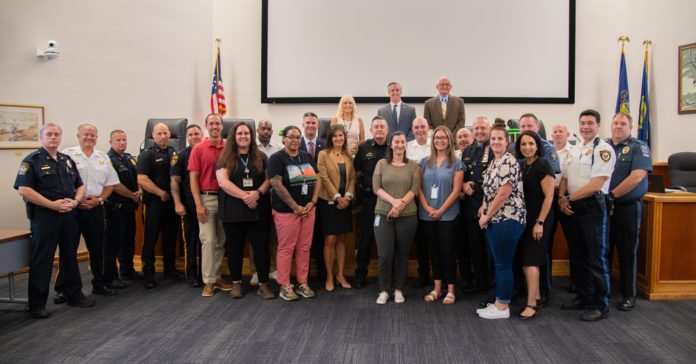Almost three years after its pilot run in Bensalem Township, the county’s Co-Responder Program is going strong and helping more people than ever.
During the recent meeting of the Bucks County Commissioners, updates were shared by the township’s director of public safety Bill McVey, Bucks County director of human services Rachel Neff and others on the program’s positive impact.
Currently, 18 police departments have at least one co-responder, or mobile social worker, embedded within. These individuals partner with law enforcement to find help and resources for those 911 calls with social service needs, ultimately diverting them away from the criminal justice system.
According to McVey, the program — and Bensalem’s co-responder Walt Bynum — has assisted 450 people since its launch in December 2020. Countywide, the program has connected 1,100 people in crisis to social service resources.
“We’re not the best at dealing with mental health or people in crisis,” McVey said of law enforcement. “We do our best, but having someone like Walt and his fellow co-responders available greatly increases our chances of success and decreases any chances of things going wrong, which can happen very easily with mental health.”

McVey provided a recent example of one elderly woman who was standing in a driveway and wearing winter clothes in the summer heat, clearly in distress. She kept running away from officers, said McVey, and locked herself in a local food store for two hours. However, upon the immediate involvement of Bynum, he was able to secure needed mental health treatment. This, in turn, greatly reduced the number of times the police were called to her home.
“Cops are skeptics. I was actually very skeptical at the time [December 2020] considering what we were going through as a country, of this program,” admitted McVey. “But I’m glad to say that, three years later, it’s been a huge success in Bensalem and in the county of Bucks.”
The Co-Responder Program has since expanded to the police departments of Falls and Middletown townships, Bristol Borough and Bristol Township, and numerous areas in Upper Bucks.
For Bynum, it’s a joy to see so many other social workers coming on board across the county.
“I think this program has the ability to span the entire county of Bucks and then move on to different cities and states,” he said.
Bynum elaborated on his role, explaining that, while police respond to immediate needs, co-responders are there to build relationships, whether that be for a week or several months. Some individuals, he added, have no support system, so the co-responders fill that void, becoming their friend and go-to person to call when they need support.
“We’re staying on to help them as they tackle their illnesses,” he said.

Neff reflected on how, in 2020, this initiative kicked off from virtually nothing but a vision of Commissioner Diane Ellis-Marseglia, with help from the District Attorney’s Office, Emergency Services and other stakeholders like NOVA and Lenape Valley Foundation.
“This program is really about connecting people to services,” Neff said.
Marseglia, who participated in a similar program during her years as a social worker in Trenton, New Jersey, said the work of the co-responders brings tears to her eyes. She hopes that more towns, such as Morrisville and New Hope, will get involved in the near future.
Commissioner Gene DiGirolamo, a longtime advocate for addiction recovery, said, “I can’t help but wonder about the human side of this and the families that have been maybe reunited and put back together … I wonder how many of those 1,100 people that you’ve kept out of jail.”
DiGirolamo went on to explain how, last month, half of the inmates going into the county’s corrections system, which is close to being overwhelmed with the number of people coming in, had to be detoxed upon admission. The Co-Responder Program, he said, is helping to prevent overcrowding by getting addicts the treatment they need, not locking them up.
Falls Township Police Chief Nelson Whitney praised the commissioners for unanimously approving the program three years ago, and stepping “outside the box that so often traps leaders in doing things the way they have always done.”
Whitney said, “For decades, we responded to calls for service involving mental health issues. And if the person involved was not in crisis often, we drove away. We got them through the night, but we didn’t really help them in the long term. This is where our co-responders shine. Partnered with a police officer, a co-responder is a transformative change in how we can provide assistance to those in need.”
Commissioner Bob Harvie elaborated on Whitney’s comments, and stressed that getting the program off the ground wasn’t easy: “A lot of people had to have an open mind with this in order for it to happen.” However, after recognizing that mental health and drug abuse were the two driving factors keeping police busy, it was realized how much the program is needed.
“If we can address those at the root and not at the back end, it makes the jobs of our police officers easier, it makes the jobs of the prison easier, and it actually delivers help to people — real help that they need — so that they’re not continually getting visits from police and ending up in jail. They can get better.”
Samantha Bambino can be reached at [email protected]


